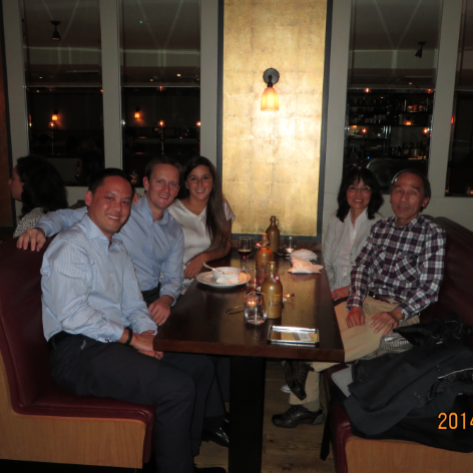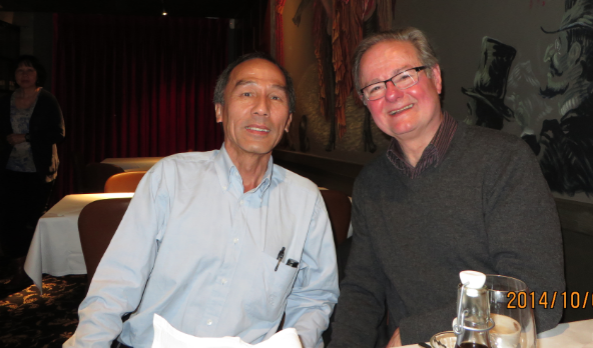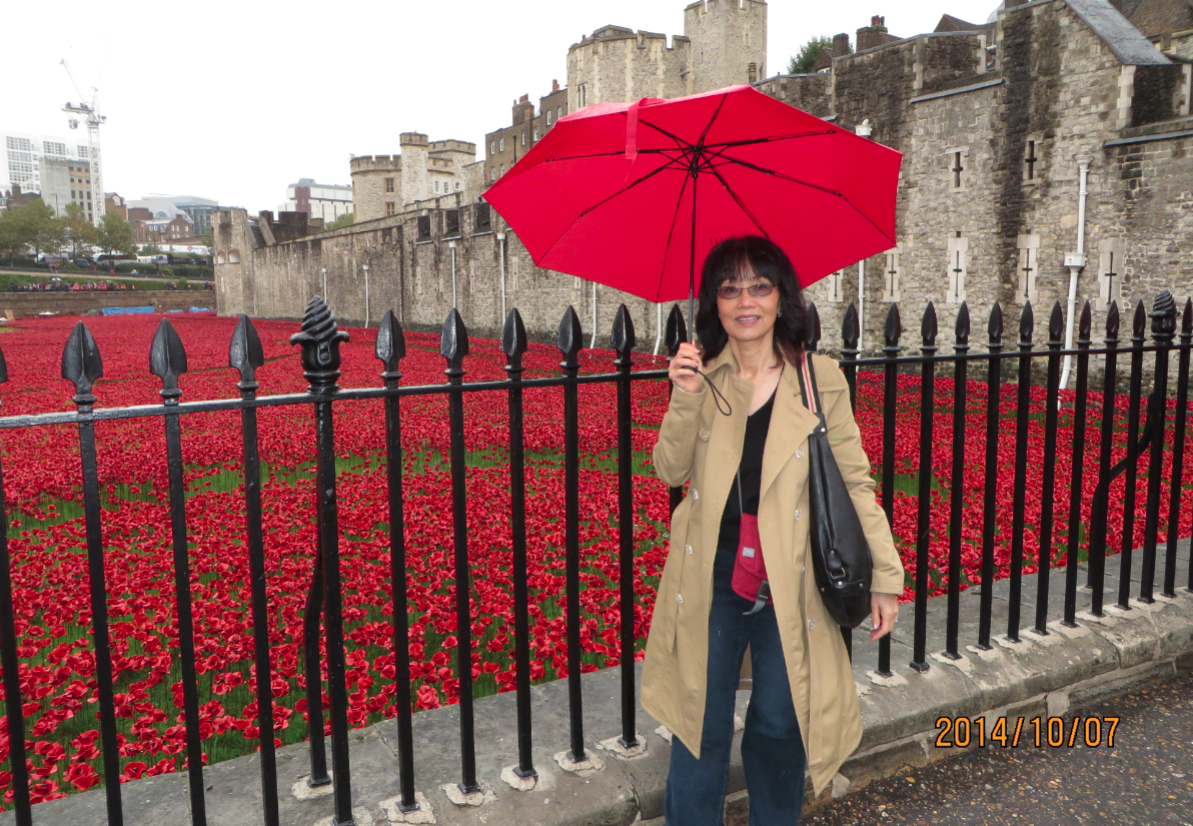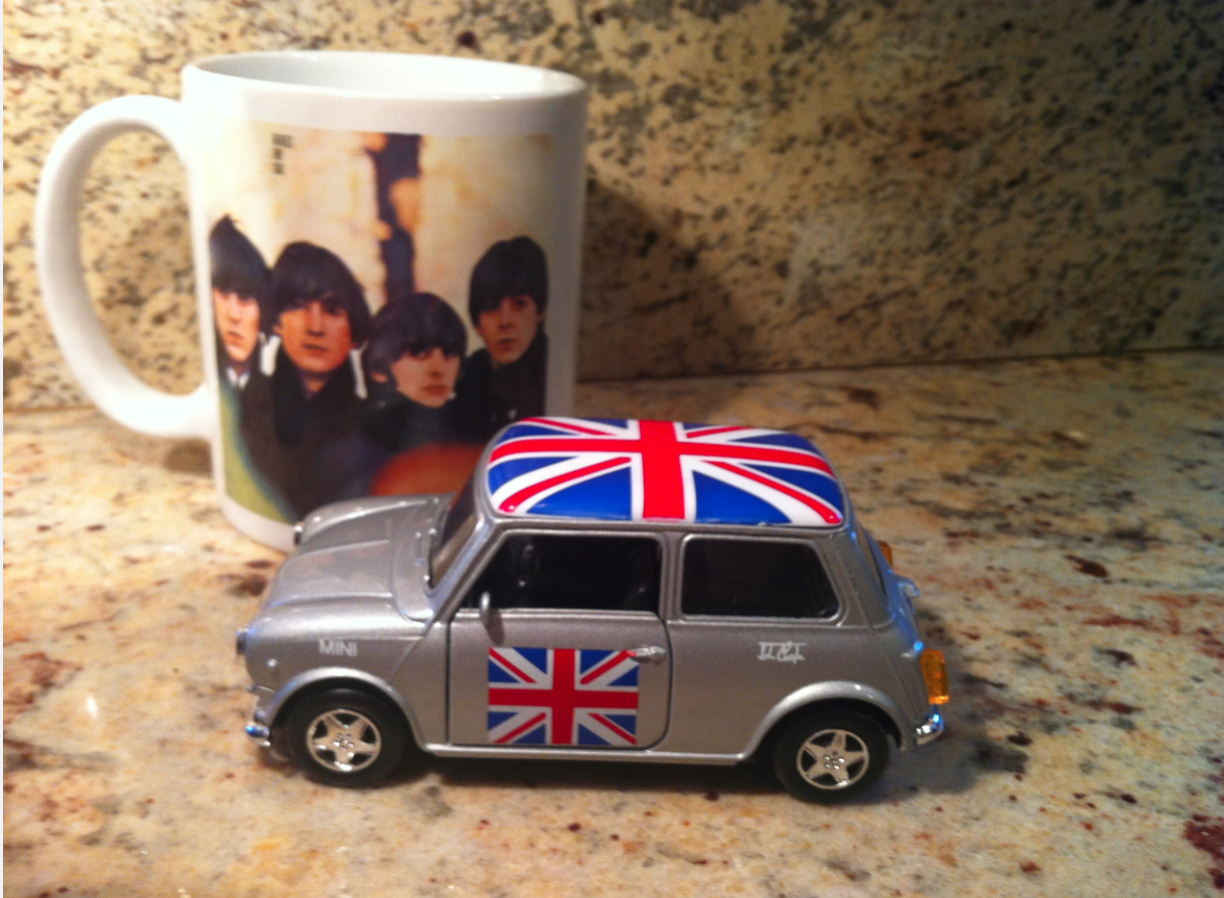JP: “Mom!
Would you like meeting with Chris – my
friend – while in London?”
Diệp: “Sure; I like that, honey!“
JP: “OK
then; I’ll arrange it … ”
*
On an early October day, about 14 hours on the planes,
crossing 8 time zones brought us from San Diego, California to London, the
capital of the Great Britain.
It was a scatteredly rainy evening in downtown London when five
of us met over dinner in a cosy restaurant.
From left: JP, Chris & his girl-friend, Diệp & Giao
Giao: “So, Chris, you were born in Britain?”
Chris: “Yeah, I’m 100%
British, born, grew up, and have been working here in London.”
Giao: “Well then; Whether
you like it or not, during this dinner, you represent not only the Queen, but
also all your British countrymen: I would like you to know that I’m grateful
to, and admire Britain as a country, and her people!”
Chris: “That sounds pretty serious! How so?”
Giao: “For two reasons:
Firstly, my being trained by the British education system, and the way Britain
has acted as a former world leader. I spent 7 years in New Zealand studying
with full scholarship sponsored by the Commonwealth countries which were headed
by Britain. Secondly, as the former world leader, your country gave up her
colonization of some 180 countries rather orderly and gracefully.”
Chris: “Interesting!
That’s good to know … ”
The
British was completely different from the French when the latter was forced to
terminate its 67 year colonization of Vietnam only after being defeated in a
bloody battle at Điện Biên Phủ in 1954.
About half a century ago, when the Beatles made their film ‘Help’, my British connection started in the summer of 1965 when I was chosen by the Colombo Plan committee to go & study in New Zealand. The Plan – with headquarters in Colombo, the capital of Sri Lanka – was a regional organization that embodied the concept of collective inter-governmental effort to strengthen economic and social development of member countries in the Asia-Pacific region. The primary focus of all Colombo Plan activities was on human resources development. Seven Commonwealth nations – Australia, Britain, Canada, Sri Lanka, India, New Zealand and Pakistan – provided full scholarships to selective high-school graduates from Vietnam, Cambodia, India, Malaysia, Singapore, and Thailand to be trained in technical skills at universities in Britain, Australia, New Zealand, and Canada. It’s note-worthy that New Zealand’s population was 2 million, as compared to South Vietnam’s 18. The expectation was that after getting their degrees, these engineers, development economists, and accountants would go home to get directly involved in their countries’ development.
When
going to New Zealand, we were treated more like diplomats than students: We all
reported to Mr. Dunlop who worked for Department of External Affairs, was later
appointed ambassador to India and/or South Korea. I learned decades after
leaving New Zealand that the visa that we were granted was valid to enter all
other Commonwealth countries.
I
spent 6 years to complete my Bachelor in Electrical Engineering & Master of
Commerce at the University of Canterbury in Christchurch, and another year
working at the Department of Electricity in Wellington – the capital. My principal professor whose name was
Richard Bates, was a brilliant & tough British native who had graduated in Great
Britain & then taught in the United States; Half of the text books that I
used – such as “’Introduction to ThermoDynamics’ – were printed in Britain; all
these in an environment very much British with Gothic architecture, fish &
chip, the Ango-Saxon language, and the way of life. Many of us could sing by
heart the New Zealand’s national anthem, ‘God
Save the Queen’.
Like
most of about 200 Colombo Plan fellows, I did return to Saigon – in 1972, after a fierce battle took place in Huế, central Vietnam’s main city – and was working with the
government in economic development –
until April 30, 1975 when South Vietnam was taken by the Communist North.
Looking
back, it was clear that South Vietnam received rather generous educational, and
economic developmental aids provided by many foreign funded programs one of
which was the Colombo Plan. Not all of these humanitarian deeds resulted in
expected results. There was one that was fatal to the donors: Professor Horst-Günther Krainick, Dr. Alois Alteköster, and Dr. Raimund
Discher, who taught at the Huế University’s Faculty of Medicine, and were
members of the West German Cultural Mission, along with Mrs. Horst-Günther
Krainick, were arrested and executed by North Vietnamese troops during their
invasion of Huế in the February 1968 Tết Offensive; A couple of months later,
the bodies of the executed professors along with many Vietnamese civilians also
executed, were discovered in a shallow mass grave near Huế.
We, the
Vietnamese as a race, are not that dumb. Take a look at following people who have
been functioning in different leading countries in the world: Philipp Rösler is a German adopted Vietnamese
politician who was the first Vice Chancellor of Germany of Asian background in
Germany. Ngô Thanh Hải is the first Canadian Senator of Vietnamese descent to sit in the Senate of Canada. Lê Văn Hiếu is the first Asian Governor of (South) Australia in the history
of Australia. Lương Xuân Việt is the first Vietnamese-American
(brigadier) general in the United States Army. It’s noteworthy that all of these
four were born in South Vietnam before 1975 when the country was
taken over by the Northern Communists.
Meanwhile in Vietnam,
39 years after the war is over, and the country unified, while blue-collar workers
have been making jeans for Levi’s, and a factory making doors for the Boeing
777 is being contracted, there has not been even one Vietnamese owned shop that
can make decent screws. In 1974, South Vietnam’s economy was about the same as
that of South Korea; Now, the latter’s per capita is more than 10 times that of
Vietnam’s.
Why there is such a
wide gap between the Vietnamese outside versus inside Vietnam, and our native country remains to be so under-developed, and poor? The answer is rather obvious: Ever since 1924, when
the first communist regime was implemented in the Soviet Union, there has been not even one country ruled
by communists, has
become better socially & economically. Smaller and poor countries must be free of dictatorship before they can
get better with their development which
may certainly be speeded up with aids from advanced countries.
Additionally
for the Vietnamese people, if we are to
salvage the country from what it is today, lessons to be learned & practice
are: tolerance, and team work.
Giao: “I’m sure you know, Chris, and JP! that
when you relinquish your colonies, you give up substantial economic benefits.
That may be why the British authorities have to nowadays, levy some 200 USD on
every tourist/passenger who lands at Heathrow Airport, to help its national
budget. I don’t think the British people enjoy, nor are proud doing that, but
they just don’t have any other options!”
Talking
about Heathrow Airport, I was so surprised to have seen as the hub
with the most international
passenger traffic in the world,
it was not well laid out, nor nicer than our San Diego Airport which is for a small
& remote city in America. This must be a reflection of the fact that since
the end of the Second World War, Britain has been losing its stand as the first
industrialized, and world leader in the old days of steam engine/locomotive,
gun powder, and sea going vessels, while countries such as South Korea emerges
itself as a new economic tiger gaining its share in the world market with (Hyundai)
shipbuilding & automotives, (Samsung) electronics, movies, etc.
Yet
in 1997, Britain show-cased a role-model act in international relations when it
returned Hong Kong – after having turned it into the finance hub of Asia - to
China. It remains to be seen if the 17 years old so-called ‘One country, two systems’ experiment may prevail.
This reminded me of another discussion I had had with Mostsy
who was born Australian, a chemist educated in Switzerland, worked &
retiring in London – with his spouse
who was Diệp’s highschool classmate:
Giao: “Don’t you think
Britain has some kinda moral obligation – with reference to the Basic Law that
had been signed off between Britain, and China in 1997 – to see that Beijing
would not grossly interfere in Hong Kong’s democracy?”
A Kiwi, and a Kangaroo,
lunching across a street surrounding
the Tower of London
Mostsy: “Well, we all
know that Britain nowadays has rather limited capabilities! It would be lucky
enough for Britain to be able to take care of just London, but not other far
away territories such as Hong Kong!”
Outside the restaurant, on the other side of the street was the
Tower of London, commemorated with 888,246 poppies symbolizing all those British
soldiers who gave their lives in the First World War 100 years ago. The castle
which was the main staging area for British soldiers preparing themselves
before going to the battles, now was seen with a dramatic flow of ‘blood’ from
a little window high up on the castle’s fence, down to the wide surrounding moat.
The scene reminded me of a well known Vietnamese phrase denoting devastating human
loss in wars, the “Núi Xương & Sông Máu
(= A Mountain of Bones & A
River of Blood)”.
The Tower of London commemorating
the First World War,
with a color matched umbrella
from San Diego, California
Mostsy who must have
exagerrated and/or joked, was just the opposite of Sir Richard Branson when the
latter briefed the press in Mojave, California, after his Virgin Galactic
spaceship’s crash. I – who had wondered, “Wasn’t
the U.S. F-35 vertical takeoff & landing design based on the British Sea Harrier
jet fighter?” – believe the British spirit is prevailing …
Back to the dinner table,
Giao: “You probably do
not know this story: Last year or so, when the new royal baby made news on
national TV in America, there was a lady who commented strongly that, ‘I think
the word ‘Commoner’ should be stricken out from now on!’ Wish you could see the
expression on her face when she said that … ”
Chris’ girl friend: “Really!
That’s funny all right … “
Giao: “Do you realize that
the British accent is so desirable that a senior friend of mine, while in New
Zealand college with full scholarship, spent quite a bit of his pocketbook to
have a British tutor teaching him how to speak like a British. The senior
visited me in San Diego recently from Sydney; and his English was more Aussie
than British!
How long do you think it would take me
to live in London before I can speak with a British accent?”
JP: “A couple of years,
I think, … at the minimum!“
Giao: “You know Chris!
If & when your company runs out of things for you to do, maybe you can make
good use of your British accent by going to New York, becoming a TV host for
CNN, just like what’s the name of that British – not Brooke Baldwin – who left
CNN several months ago?”
JP: “You mean Piers Morgan?”
Giao: “Yeah, that’s the one: Piers Morgan!”
When dinner was over, the rain stopped as the five of us
were walking toward a metro station,
Chris: “You know,
I’m not sure where we ought to be going now … “
Giao: “By
the way, Chris: Thanks for taking care of JP when he’s in London!”
Chris: “Don’t
you worry about JP; He can take care of himself very well!”
A couple of well-known British made
products
The sound of the first rain of the season at home, in San
Diego brings me back to the rainy London. There I was, sitting in the middle of
an ocean of people at the Piccadilly Circus square, listening to a guitarist
singing John Lennon’s ‘Imagine’ next
to the fountain while watching the flashing of several Hyundai automobile
models displayed on multiple large screen TVs on surrounding building walls. It
was my first trip to London, and I could tell you with confidence, that British
culture is much more than the castles, palaces and all those artifacts visible
on the streets of Piccadilly.
High
up in the sky, the London Eye will continue witnessing water of River Thames flowing
slowly underneath the bridges … Twenty five years after the fall of the Berlin
Wall, while the scene at the Tower of London was rather bloody, my British
Connection which started with the rock music ‘British Invasion’ half a century ago, has
been nothing but lovely.
Nguyên Giao



